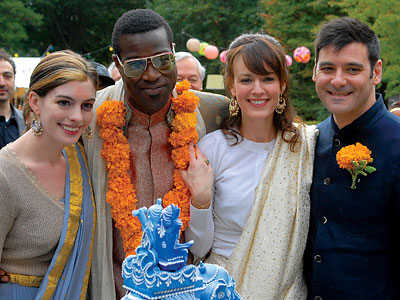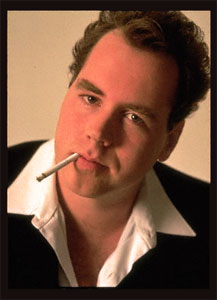I've held my tongue for a long time, but after this, I can remain silent no longer.
Please, for the love of music, fire Sasha Frere-Jones.
This man has no business being a so-called "rock critic," much less the only reviewer of popular music of any kind at a publication so vaunted and respected as yours.
I have believed this for many years, and I believe it no less firmly now.
Exhibit A: Please note his
"Best of 2008" list. Now, I know this sort of compilation of the year's best is by it's very nature somewhat subjective, but come on! Where was the editor on this piece, and why wasn't he saying, "Uh, Sasha...yeah. This list looks like it was written by a 13 year-old girl." Why?
Permit me to clarify that. The list looks like it was written by a 13 year-old girl who knew that some people with more respectable tastes would be reading her list, so she did some quick research and threw on some Radiohead to be safe.
Now, I'm not a slave to hipsterdom by any means, and I haven't heard every album on every critic's top ten list, but when bands like
TV On The Radio,
Fleet Foxes,
GirlTalk, and the like make it to EVERY OTHER CRITIC'S list, maybe you missed something, my man. Also, when you accuse
an amazing, musically gifted artist of being racist for not liking hip hop, then it's probably not OK to put him on your list. Maybe you should just leave him alone, because you've already proven that you hate good music.
THIS is how you do a year-end list.
Exhibit B: This is a man, who works as a critic of rock/pop music,
who has stated publicly (and I paraphrase) that he did not understand why Radiohead was so influential until 2006, when the band was working on their (admittedly good) "In Rainbows," and touring, when Mr. Frere-Jones "happened" to catch them live.
Excuse me?
Are we talking about the same Radiohead, whose journey from 1993's "Pablo Honey" and 1995's "The Bends," through on 2000's "Kid A" and 2001's "Amnesiac," with a little pit stop in 1997 that we cognesceti like to call 1997's "OK Computer," has been widley regarded as the most amazing, soul-baring, and wild ride since The Beatles?
THAT Radiohead? You never saw a reason to listen to them? Until 2006? That's like saying, "Yeah, I love the Rolling Stones. 'Steel Wheels' is a great album."
That ought to be enough to stop this man from getting work, but I have one more exhibit to draw your attention to.
Exhibit C: In this week's issue of
The New Yorker, Mr. Frere-Jones profiles the beguilingly brash British chanteuse Lilly Allen, over whom he fawns for nearly five pages. He mainly draws the reader's attention to her lyrics, which he describes as "lyrics that sound like they could be the thoughts of any young woman anywhere in the world." Never mind the fact that, in the second paragraph of the article, he calls her song, "The Fear," "one of the few compelling songs about fame by a famous person." Never mind the fact that, despite Mr. Frere-Jones firm belief in the universality of Ms. Allen's experiences as evinced by her lyrics, she grew up the daughter of a major movie producer and a comedian and was friends with Joe Strummer and Damien Hirst.
When he breathlessly claims that "None of this [Allen's privileged upbringing] has much to do with how Allen became known," Mr. Frere-Jones pretty much proves that a) he needs to get out of New York once in a while, and b) that he has no understanding of the way the world works. Remember, he thinks that her thoughts could be those of any girl, anywhere (one presumes that he excludes, say, Somalia, Pakistan, and other "icky" parts of the world), and yet two pages later, he writes about her buying an $8,000 gold Rolex watch. Oh, and
he compares her online to Karen O. of the The Yeah Yeah Yeahs. Now, either Mr. Frere-Jones is trying to write the deepest, most obliquely ironic profile/review ever, or he's a complete moron, completely out of touch with the world of music, and completely full of shit.
Now, editors of The New Yorker, I don't expect this request to terminate Mr. Frere-Jones' employment to be carried out immediately. His brand of arch-yet-naive, facile, and under-informed and over-analytical brand of criticism demeans your magazine's otherwise good name and ensures that no one will ever turn to it for well-reasoned, credible rock criticism.
Oh, and I loved
your article on David Foster Wallace, by the way.
Yours,
Blue Derkin










